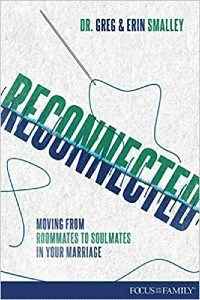Four Ways to Strengthen Friendship and Connection in Marriage
Avoid drifting apart in marriage by strengthening your attachment with your spouse.
Healthy Marriage Traits
Facebook
Twitter
LinkedIn
By Focus on the Family

ARTICLE
How to Reconnect When You’re Lonely in Your Marriage
Don Morgan
Experts identify seasons of marriage prone to producing loneliness. The challenge is to anticipate those lonely periods, learn how to navigate them and turn them into growth opportunities.

BOOK
Reconnected: Moving from Roommates to Soulmates in Your Marriage
Dr. Greg and Erin Smalley
Practical ways to rekindle the passionate, intimate, heart-to-heart spark of connection between husbands and wives.










“A successful marriage requires falling in love many times, always with the same person.”
~ Mignon McLaughlin
Friendship is one of the most essential qualities of a thriving marriage. But the stress and pressures of everyday life — including work, children, finances, household responsibilities and media overload — can easily push couple-time to the bottom of the priorities list. That’s when spouses start to drift apart, and loneliness can set in.
Loneliness in marriage is a unique pain
Marriage is called “tying the knot” for a reason. We bind ourselves together —for better, for worse, for richer, for poorer … til death do us part. By God’s own definition, marriage is about oneness and intimacy: A man and his wife “become one flesh” (Genesis 2:24).
But marriage doesn’t promise to insulate us from loneliness. And living with a spouse doesn’t guarantee connection and friendship. Psychology Today notes that nearly 63% of people who reported being lonely were married and living with their spouse. Further, therapist Darlene Lancer writes:
People tend to think of abandonment as something physical, like neglect. Loss of physical closeness due to death, divorce, or illness can be felt as an emotional abandonment as well. But emotional abandonment has nothing to do with proximity: It can happen when the other person is lying right beside us, when we can’t connect or when our emotional needs aren’t being met in our relationship.
Ironically, this sort of loneliness in marriage can feel even more painful because your spouse is with you physically but not emotionally. You live together, but you don’t do life together. The resulting loneliness and alienation can feel too heavy to endure.
Bottom line? You and your spouse can live in the same house, eat at the same table, even sleep in the same bed, and still feel isolated. Disconnected. Alone. It’s the very opposite of what marriage should be.
So, how can a couple navigate life’s challenges and remain connected?
How to strengthen friendship and connection in marriage
Here’s the reality: Love isn’t self-sustaining. FamilyLife founder Dennis Rainey writes, “Every marriage will naturally move toward a state of isolation. Unless you lovingly, energetically nurture and maintain intimacy in your marriage, you will drift apart from your spouse.”
Your marriage relationship won’t maintain itself. It can’t. Connecting with your spouse requires time, attention and intention. Thriving couples are intentional about spending time together in meaningful conversations and enjoyable experiences that strengthen their bond and deepen their friendship.
Consider these four ways to guard against loneliness and drifting apart, and to strengthen your friendship and connection:
Deal with underlying issues
If you’ve felt lonely in marriage, you may have tried the typical advice to just spend more quality time together. OK. So you lined up date nights, made couple friends, discovered a common hobby, had more sex — and yet you still feel like there’s a Grand Canyon-sized gap between you and your spouse. The problem? Everyone has baggage. And the roots of loneliness are too complex to gloss over even with the most proactive bonding activities.
Yes, quality time together is important. And because most of us want to act on a problem, we easily assume that doing equals fixing — so bring on the full calendar! However, when it comes to addressing loneliness, doing more of the same things won’t help. The truth is that real, lasting change starts when you are still, when you first take time to reflect on and deal with underlying issues.
God gives us a model for this in the Bible: “Be angry, and do not sin; ponder in your own hearts on your beds, and be silent” (Psalm 4:4). In other words, spend time thinking through what might be driving your or your spouse’s withdrawal. What might be feeding feelings of isolation and loneliness?
NOTE: Marriage struggles can range from minor to serious to crisis-level, with each requiring a different kind of help. If anything from the list below raises a red flag, call our licensed or pastoral counselors for a free over-the-phone consultation.
Loneliness in marriage can stem from seasons of change, character flaws that need humble correction, wounds from the past or fears of the future. Add in the fact that a husband and a wife wrestle with their own worries in addition to concerns about their marital relationship, and it’s no wonder that isolation and disconnection are a constant threat.
What’s the solution? As much as possible, clear the calendar of all commitments aside from work so you can focus on each other and deal with underlying issues.
Create connection rituals
Busyness is the scourge of marriage. Couples often try to cope by having the occasional date night, vacation or holiday gathering to make up for lost connection. But a marriage can’t survive from vacation to vacation or date night to date night. Happy marriages aren’t created by accident or one-and-done moments.
Instead, couples need to be proactive in maintaining emotional connection. One way to do this is to establish intentional, consistent connection rituals. These daily behaviors and activities develop reminders of secure attachment to your spouse. They help create shared meaning, strengthen your emotional bond and nurture a strong sense of “we-ness.” Here are some examples:
Regular moments together create shared meaning for your marriage and strengthen your bond. Over time, they reinforce the security you have with each other — and they help you rediscover your spouse.
Rediscover your spouse
Our brains are hardwired to steer us toward what’s familiar. Certain things in our lives such as surroundings, routines, food, music and clothes make us feel comfortable and safe. In a similar way, familiarity with our spouse can lead to feelings of contentment and safety — as it should. Unfortunately, it can also lead to complacency. Unlike our standing latte order, presuming predictability in marriage is unrealistic at best and harmful at worst.
After years of marriage, we can fall under the illusion that we know everything there is to know about each other. However, your spouse is not the same person you married — and you’re not the same person your spouse married. You might think you know your spouse’s favorites (food, hobbies, music, TV show, retail store, coffee order, toothpaste and more), but change is the only constant in life. Meaning what? You probably don’t know your spouse as well as you think you do.
Instead of assuming that you know what’s significant to your spouse, regularly “rediscover” them. Are you familiar with Proverbs 5:19? The English Standard Version of the Bible says that a man’s wife is “a lovely deer, a graceful doe. Let her breasts fill you at all times with delight; be intoxicated always in her love.” And the Aramaic Bible in Plain English translation really brings the end of that passage to life: “… learn her ways always and think on her love.”
What great advice: Learn her ways always. (Or, to the wife, learn his ways always!)
How? Study your spouse. Pay close attention to obvious details as well as the unspoken places of their heart. Notice likes, dislikes, interests, dreams, hopes, fears, desires and passions — and remember that those things can change from day to day! Fall in love with them for who they are today rather than who you first married.
Curiosity keeps passion alive because it revives the interest, intrigue and fascination present in the early years of your relationship. Get to know your spouse in new ways by paying attention and staying constantly eager to learn their ways.
One lifetime isn’t long enough to truly know each other because you’re always changing. So take joy in rediscovering your spouse over and over. Every single thing you learn about each other will lead to deeper friendship and connection.
Practice emotional availability
The Bible gives a great framework for how to build that friendship and connection:
Likewise, husbands, live with your wives in an understanding way, showing honor to the woman as the weaker vessel, since they are heirs with you of the grace of life, so that your prayers may not be hindered (1 Peter 3:7).
What is the apostle Peter talking about here? In part, being emotionally responsive.
Marriage expert Dr. Sue Johnson, who founded Emotionally Focused Therapy (one of the most researched couples therapy models), says, “The most important thing we’ve learned … in the last 35 years is that the secret to loving relationships and to keeping them strong and vibrant over the years, to falling in love again and again, is emotional responsiveness.”
Emotional responsiveness has two main components: accessibility and responsiveness.
Accessibility means that you are available and open to your spouse’s emotions
People desperately want to be deeply known. In fact, the essence of intimacy is into me see. Your spouse wants to trust that you will be available when they’re hurting.
Sadly, they often have to compete against kids, social media, work obligations and more for our attention. Accessibility requires you to first recognize your spouse’s feelings (emotional awareness) and then be present and embrace their emotions — any hurt, insecurity, frustration or fear.
Responsiveness is how you’re impacted by your spouse’s emotions
When people are hurting, they don’t just want you to recognize that fact; they want you to care. They want to trust that you will respond to them with empathy. (When God says, “live with your wives in an understanding way,” the word understanding also means “empathetically aware.”)
Sympathy is when you feel bad for someone; empathy goes much deeper. Empathy is when you feel bad with someone — when you imagine what that person is feeling and place yourself in their emotions. Teddy Roosevelt once said, “People don’t care what you know until they know that you care.” (This is a great reminder that even if you have an amazing fix for a problem, your spouse won’t care about your brilliance until they know that you care about them!)
Empathy is what Jesus modeled after His close friend Lazarus died. When Jesus found Lazarus’ family deeply grieving, He took time to emotionally respond to the family: He wept. Now, why did Jesus “waste” time weeping with the family before going right for the resolution? He knew that He was going to raise Lazarus from the dead — if He had simply done that right away, there would have been no need for sorrow! Why did He first empathize with the family?
Whatever else Christ had in mind, His actions make clear the importance of connecting with people’s pain. In the same way, when you deeply connect with your spouse’s heart, you send a clear message that they matter. You’re saying, “You are valuable to me.”
What it all comes down to
“Good friends are hard to find,” say Drs. Les and Leslie Parrott. “And when found — particularly in marriage — we sometimes take them for granted.” Don’t let that be you. Don’t merely love your spouse for a lifetime. Like them every day and enjoy friendship with each other.
Questions for discussion
© 2021 Focus on the Family. All rights reserved. Originally published on FocusOnTheFamily.com.